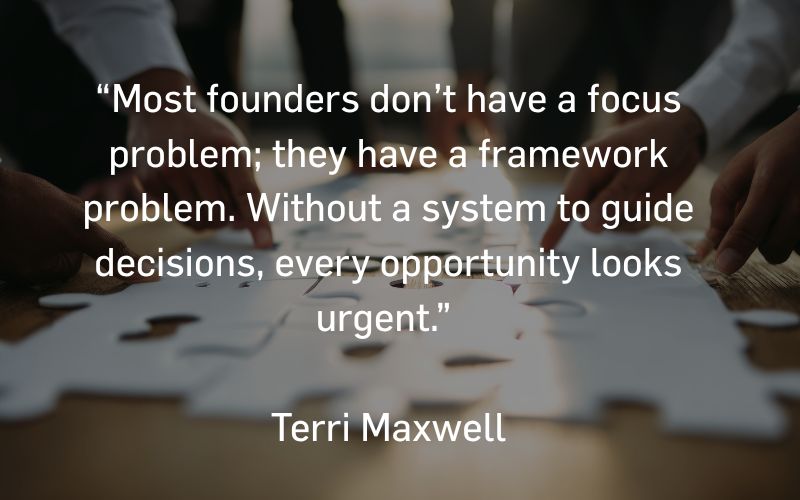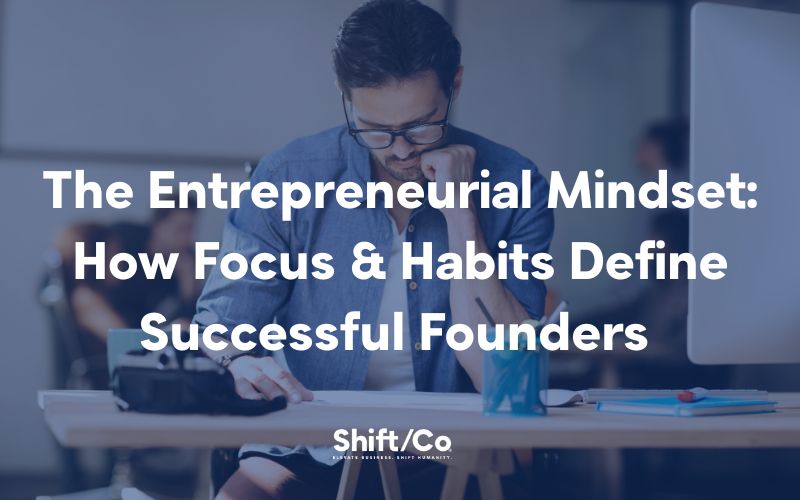Every entrepreneur begins with a spark, a vision that’s bigger than themselves and a desire to bring a conscious business to fruition. Yet, translating that vision into sustainable success requires more than passion or persistence. It requires mastering the entrepreneurial mindset — a way of thinking that combines purpose, focus, and consistent habits.
It’s about learning to think like a founder and conscious entrepreneur: seeing opportunity in uncertainty, turning challenges into systems, and transforming time, your most limited resource, into a strategic asset.
As Terri Maxwell, CEO of Shift/Co, explains, “Entrepreneurship demands a completely new set of skills. You go from having structure handed to you [in the corporate world] to having to create it. Focus isn’t a luxury; it’s survival.”
The founders who thrive, even with the multitude of distractions, are those who learn to focus their energy on what truly matters — and build habits that make that focus second nature.
This blog explores how focus and habits are central to developing the entrepreneurial mindset.
Why Focus Feels So Hard for Entrepreneurs
Entrepreneurship offers freedom, but with that comes a hidden challenge: no boundaries.
There’s no boss to set priorities, no clear clock-in or clock-out time, and no single definition of success. As a result, most founders live in a constant state of mental overload.
Terri Maxwell, CEO of Shift/Co, often describes this as the “founder fog.”
“Every founder feels like there are thousands of things to do and never enough hours to do them. The vision is bigger than the to-do list. But the gap between mission and daily reality can feel paralyzing.”
This is the paradox at the heart of the entrepreneurial mindset and a conscious business. Founders crave autonomy, yet the very freedom they build can become the source of their stress. Without structure, focus becomes reactive, pulled by urgency instead of guided by intention.
Many entrepreneurs confuse activity with progress. They fill their calendars, answer every email, and call it productivity, but end the day wondering if they moved the business forward. The result? Constant busyness, but limited momentum.
Lack of focus doesn’t come from laziness or poor motivation… it comes from trying to manage too much without a clear system. Founders step into a business world where every decision matters, but not every decision moves the mission forward.
This is where the entrepreneurial mindset becomes essential. Developing focus isn’t just about doing less; it’s about thinking differently and shifting from reactive work to intentional leadership. This is what conscious entrepreneurs embody.
The Science Behind an Entrepreneurial Mindset
How do you handle uncertainty, opportunity, and stress? Entrepreneurs naturally think differently from most people. They see patterns where others see chaos, and potential where others see risk. But this same gift can also make focus feel elusive.
Entrepreneurs are idea generators — constantly innovating, scanning for opportunities, and problem-solving. Neuroscience shows that people with strong entrepreneurial traits often have higher levels of dopamine, the neurotransmitter linked to curiosity and motivation. That means founders are wired to chase new ideas and possibilities which fuels innovation but also leads to distraction.
As Terri Maxwell, CEO of Shift/Co, explains:
“Entrepreneurs aren’t broken because they struggle to focus. Their brains are built for exploration. The key is learning to channel that energy instead of fighting it.”
This is where entrepreneurial thinking diverges from traditional business management. Most systems are designed for employees — people who need to follow established processes. Founders, however, have to create the processes. Their focus must be internally driven, not externally imposed.
That’s why structure and habits aren’t constraints for entrepreneurs. By building intentional frameworks around how they think and act, founders can protect their creative energy and direct it toward meaningful progress.
Developing an entrepreneurial mindset, then, isn’t about suppressing curiosity, it’s about aligning it. When you understand how your mind works, you can design habits that turn your natural tendencies into tools for focus and growth.
The Founder Focus Roadmap: Turning Thinking into Action
A key characteristic of an entrepreneur is the ability to turn ideas into action. That requires structure. Without it, even the best intentions get buried under distractions and competing demands.
The Founder Focus Roadmap was created to help entrepreneurs channel their natural creativity into consistent, strategic progress. It’s a simple but powerful discipline that helps you identify where your time and attention are being spent and where they should be.
As Terri Maxwell, CEO of Shift/Co, explains:
“Most founders don’t have a focus problem; they have a framework problem. Without a system to guide decisions, every opportunity looks urgent.”
The roadmap highlights four behavioral states entrepreneurs move through:
- Stuck — You’re overthinking, underacting, and losing energy to fear or uncertainty.
- Unfocused Action — You’re busy but not productive; working hard without clear direction.
- F.U.D. (Fear, Uncertainty, Doubt) — You’re questioning your ability or strategy, which slows momentum.
- Mastery — You’re operating with clarity, executing intentionally, and building habits that align with your mission.
The goal isn’t perfection — it’s awareness. Once you know which state you’re in, you can apply the right strategy to move forward.
Terri often reminds founders that motion isn’t the same as progress.
“You can be a stationary hurricane — spinning fast but not moving anywhere. Mastery is when every ounce of effort is directed toward impact.”
By using the Founder Focus Roadmap, entrepreneurs begin to replace reaction with intention — transforming focus from a struggle into a practiced skill.

Time as a Strategic Asset — A Core Trait of Entrepreneurial Thinking
One of the most defining characteristics of a conscious entrepreneur is how they view time. Most people see time as something to spend. Successful entrepreneurs learn to see it as something to invest.
Entrepreneurial thinking reframes time as a strategic asset — one that can either multiply your results or quietly drain your potential. Every meeting, email, and task either compounds your progress or distracts you from it.
As Terri Maxwell, CEO of Shift/Co, puts it:
“Focus isn’t about managing time. It’s about managing energy, deciding what deserves your best attention, and what doesn’t.”
The reality is, not all hours are created equal. Founders must learn to align their highest energy with their highest-value work and protect it fiercely. That’s why the most effective entrepreneurs apply a simple filter to every decision:
- Do: what’s essential and aligned with your mission.
- Delegate: what can be done better or faster by someone else.
- Drop: what doesn’t move the business forward.
This “Do, Delegate, or Drop” framework helps transform chaos into clarity. It’s not about doing more. it’s about doing what matters most.
By treating time as a conscious investment, entrepreneurs create the space to innovate, lead, and scale sustainably. The payoff isn’t just productivity — it’s peace of mind.

Habits That Strengthen the Entrepreneurial Mindset
Focus is a daily discipline, not a one-time decision. The most successful founders don’t wait for clarity to strike; they create it through consistent habits that reinforce their entrepreneurial mindset.
As Terri Maxwell, CEO of Shift/Co, shares,
“Habits are how focus becomes automatic. You can’t think your way into clarity, you have to train for it.”
These habits aren’t complex. In fact, simplicity is what makes them powerful.
1. Start with reflection.
Take a few minutes each morning to ask one question: “Will what I’m about to do move me closer to my goal?” This single prompt builds awareness and helps you lead your day instead of react to it.
2. Stack your routines.
Pair habits together so they reinforce momentum. For example, review priorities right after your morning coffee, or end your day with a quick note of what worked and what didn’t.
3. Protect your energy.
Focus isn’t just mental; it’s emotional. Build rhythms that recharge you, whether it’s journaling, walking, or creative thinking time.
These small, intentional routines compound over time, turning focus into a reflex and progress into a pattern.
Developing the right habits cultivate the mindset of an entrepreneur who leads with purpose, not pressure.
The Next Evolution of the Entrepreneurial Mindset
Focus and habits aren’t just tools for managing time. They’re the foundation of the entrepreneurial mindset. They turn vision into structure, disorganization into clarity, and effort into impact.
As Terri Maxwell, CEO of Shift/Co, reminds us,
“Entrepreneurs don’t fail because of a lack of passion. They struggle because they haven’t learned how to focus their energy on what truly matters.”
Mastering focus and habits is about awareness and choosing where to invest your time, attention, and creativity so your business grows with you, not at your expense.
If you’re ready to strengthen your entrepreneurial mindset and connect with others who are building purpose-driven success, explore the Shift/Co community, where founders grow businesses that matter.
Many of the principles shared here are inspired by the work of Terri Maxwell, CEO of Shift/Co, drawing from over two decades of business growth and leadership experience.

Shift/Co is a global community dedicated to conscious business growth. We empower entrepreneurs to grow their businesses through innovative tools, expert coaching and mentoring, and a supportive network. Our comprehensive approach includes personalized training, leadership development, and a collaborative environment, ensuring that members can achieve significant business growth while positively impacting the world. Join Shift/Co to elevate your business and be part of a movement that believes in doing good business better.
See Also:
From Side Hustle to Business: A Conscious Entrepreneur’s Guide to Scaling with Purpose
Why Respect Is Non-Negotiable for Conscious Entrepreneurshttps://shiftco.org/blog-why-respect-is-non-negotiable-for-conscious-entrepreneur
From Overwhelm to Output: Small Business Productivity Tips for Conscious Entrepreneurs

